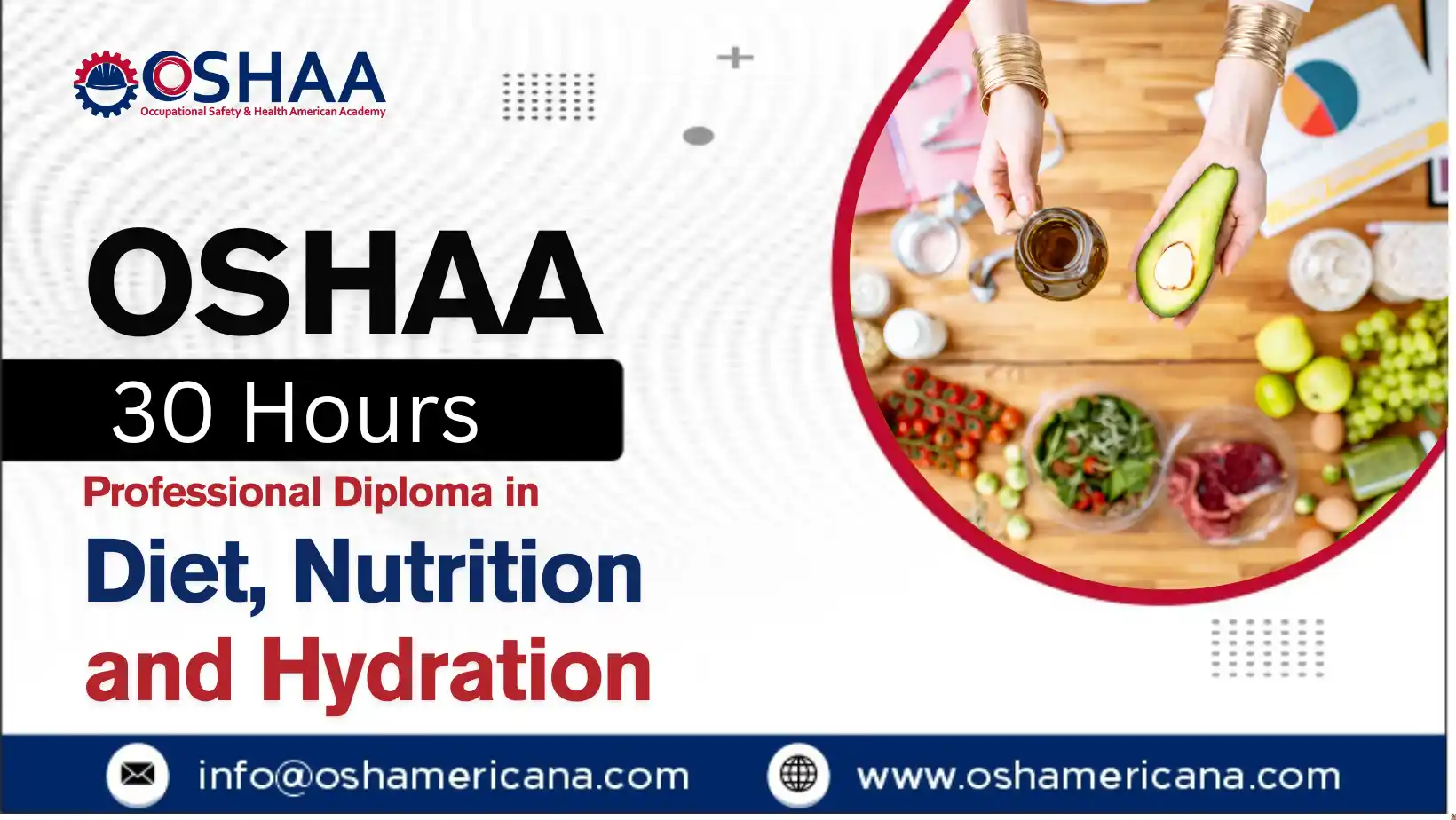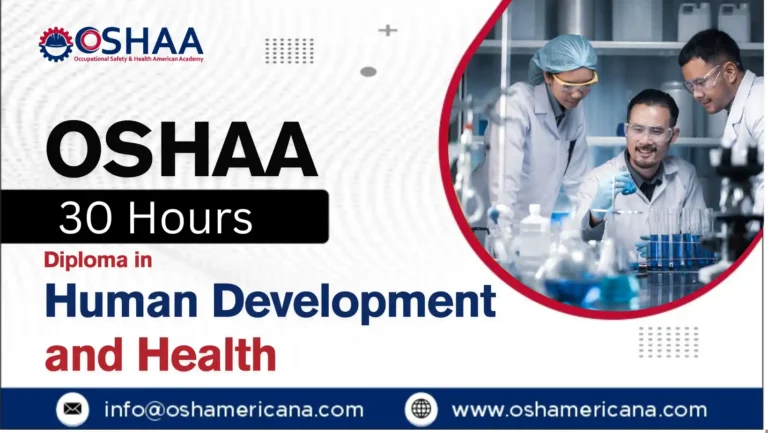The OSHAA 30-Hours Professional Diploma in Diet, Nutrition and Hydration is a comprehensive training programme designed to meet the growing need for evidence-based nutrition education within healthcare and community settings. Structured to support Continuing Professional Development (CPD), this diploma equips participants with in-depth knowledge of essential nutritional principles and hydration practices vital for patient care, health promotion, and wellbeing.
Proper nutrition and adequate hydration are critical to recovery, disease prevention, and overall health management. Poor dietary choices and dehydration are linked to a range of adverse outcomes, including hospital readmissions, increased length of stay, and reduced quality of life.
Through this diploma, participants gain the competencies needed to contribute to nutritional planning, identify risks of malnutrition or dehydration, and support behaviour change in diverse populations, including children, older adults, and those with complex care needs.
The OSHAA 30-Hours Professional Diploma in Diet, Nutrition and Hydration is an ideal choice for professionals seeking a deeper understanding of the impact of nutrition on health and wellbeing. With its practical focus and CPD alignment, the diploma empowers participants to make informed, confident decisions in their daily roles, whether in direct care, health promotion, or community outreach.
OSHAA 30-Hours Professional Diploma in Diet, Nutrition and Hydration
Study Units
Learning Outcomes
Fundamentals of Human Nutrition and Dietary Balance (4 hours)
- Understand the basic principles of human nutrition and the functions of nutrients
- Recognise the components of a balanced diet and their role in maintaining health
- Identify the effects of undernutrition and overnutrition on the body
- Describe how dietary needs vary across life stages
Understanding Macronutrients and Micronutrients (4 hours)
- Distinguish between macronutrients (carbohydrates, proteins, fats) and micronutrients (vitamins, minerals)
- Explain the functions of key nutrients and their sources
- Identify the signs and health effects of nutrient deficiencies or excess
- Apply knowledge of nutrient roles to inform dietary choices and recommendations
Hydration and Fluid Management Across the Lifespan (3 hours)
- Understand the importance of adequate hydration for physical and cognitive health
- Recognise signs and symptoms of dehydration in different age groups
- Identify recommended fluid intake levels based on age, activity and health status
- Support hydration strategies in clinical and care settings
Nutritional Guidelines and National Standards (5 hours)
- Interpret UK nutritional guidelines such as the Eatwell Guide and SACN reports
- Apply national standards to dietary planning and health promotion
- Understand the role of NICE guidance in shaping nutritional interventions
- Promote food-based recommendations using recognised frameworks
Nutrition in Clinical Conditions and Chronic Illness (4 hours)
- Understand how nutrition supports management of conditions such as diabetes, cardiovascular disease and obesity
- Recognise the role of diet in reducing inflammation and supporting recovery
- Identify the dietary needs of individuals with gastrointestinal, renal or metabolic disorders
- Adapt dietary advice for people with complex health conditions
Nutritional Screening and Risk Assessment Tools (3 hours)
- Understand the purpose and process of nutritional screening
- Use tools such as MUST (Malnutrition Universal Screening Tool) to assess risk
- Interpret screening results to inform appropriate interventions
- Recognise when to escalate concerns to dietitians or healthcare professionals
Food Safety, Allergen Awareness and Label Interpretation (3 hours)
- Understand the principles of food safety and hygiene in healthcare and community settings
- Identify common food allergens and their impact on health
- Interpret food labels to assess nutritional value and allergen content
- Support individuals with dietary restrictions or special nutritional needs
Cultural, Religious and Ethical Considerations in Diet (4 hours)
- Recognise the influence of culture, religion and personal values on dietary choices
- Adapt nutrition support to respect individual beliefs and preferences
- Understand ethical considerations such as vegetarianism, veganism and sustainability
- Promote inclusive and respectful dietary practices in diverse settings
Course Benefits: OSHAA 30-Hours Professional Diploma in Diet, Nutrition and Hydration
- Recognised CPD Accreditation
Achieve a professionally recognised 30-hour CPD qualification aligned with international standards, supporting professional development and portfolio building. - Enhanced Nutritional Knowledge
Develop a strong foundation in diet, nutrition, and hydration that can be applied across a wide range of healthcare, community, and wellness settings. - Improved Patient and Client Outcomes
Apply evidence-based dietary practices to support the health, recovery, and wellbeing of individuals across all age groups and care needs. - Versatile Professional Application
Gain practical knowledge that is valuable for professionals in healthcare, social care, education, fitness, and public health roles. - Support for Regulatory and Quality Standards
Contribute to compliance with CQC, NICE, and public health guidance through accurate nutritional support and documentation. - Risk Reduction and Preventative Care
Learn to identify and address malnutrition, dehydration, and dietary-related health risks before they escalate into more serious conditions. - Behaviour Change Competence
Acquire skills to effectively promote healthy eating and hydration habits using behaviour change models and communication strategies. - Inclusive and Culturally Aware Practice
Understand how to provide personalised nutrition support that respects cultural, religious, and ethical dietary considerations. - Practical Tools and Screening Knowledge
Use professional screening tools such as MUST to assess and respond to nutritional risk in clinical and care environments. - Career Progression and Revalidation Support
Strengthen professional standing, support role expansion, and meet revalidation or inspection requirements with verifiable CPD hours.
The OSHAA 30-Hours Professional Diploma in Diet, Nutrition and Hydration is designed for participants working in roles where nutritional knowledge supports professional care, wellbeing, or health promotion. It is ideally suited for:
- Healthcare professionals seeking to enhance their understanding of nutrition and hydration in clinical and care settings
- Care workers, support staff, and senior carers involved in meal planning, patient support, or hydration monitoring
- Public health professionals and health educators delivering dietary advice in community-based programmes
- Fitness trainers, wellness coaches, and rehabilitation specialists aiming to provide informed nutritional guidance
- School and early years staff responsible for children’s wellbeing and dietary provision
- Individuals pursuing professional development or revalidation with a recognised CPD qualification
This course is suitable for participants across a wide range of sectors who are committed to delivering informed, respectful, and effective nutritional support within their scope of practice.







